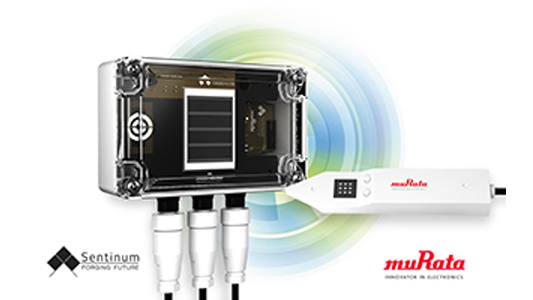Murata, in collaboration with longstanding systems integration partner Sentinum, has made a major announcement that will further progress the widespread automation of crop production.
The new GAIA soil monitoring solution from Sentinum has a pivotal role to play in smart agriculture – helping to maximize crop yields while keeping down fertilizer use and minimizing the amount of water needed for irrigation purposes. Its name is taken from Greek mythology, describing the Earth Mother from which all living things originate. GAIA leverages Murata’s engineering expertise in high-accuracy sensing and low-power wide area network (LPWAN) technology.
The multi-function sensor head can take accurate measurements of numerous parameters, so that the condition and composition of soil may be assessed. Valuable data can be obtained on the soil’s temperature and moisture levels, as well as fertilizer concentrations, by using electrical conductivity to determine the resistive properties of all its different constituents. Such data may be collected at regular intervals and then sent via a LPWAN connection (either LoRaWAN®, mioty®, or NB-IoT) to a cloud-based backend for subsequent analysis.
GAIA has a soil temperature measurement range of −20°C to 60°C with a ±1.06°C full-scale accuracy. It has a temperature-compensated 0 to 60% soil moisture range with a ±3% full-scale accuracy. By having 9 electrodes in the sensor head, supported by sophisticated proprietary algorithms, the presence of rocks, large volumes of water, or other items that might have a detrimental effect on measurement accuracy can be avoided.
Reliance on LPWAN connectivity protocols means that little energy needs to be drawn from the system’s battery, thereby significantly extending the working lifespan. Alternatively, the inclusion of a photovoltaic module eliminates the need for battery placement, so operations can be benefited from maintenance-free.
As Juli Ban, Product Manager at Murata explains: “The accuracy of soil sensor hardware currently on the market can be seriously impacted by temperature variations and high water content levels, along with the presence of rocks and chemical ions, since they rely on bulk electrical conductivity. GAIA goes beyond just taking bulk measurements, as it can also ascertain pore electrical conductivity, thanks to the multi-electrode arrangement and advanced algorithms employed.”
“Consequently, the results obtained are of superior quality to those of competing solutions. This means that farming activities will be much better optimized and more sustainable, with greater crop yields being achieved, plus water and fertilizer resources being saved,” he concludes.
GAIA is a robust industrial-grade solution that is highly suited to the challenges of outdoor deployment. It is also fully applicable for indoor usage, such as in greenhouses or vertical farming sites.
For more information, visit Murata’s website at www.murata.com












